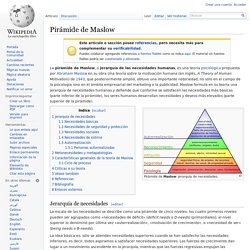

Pirámide de Maslow. La pirámide de Maslow, o jerarquía de las necesidades humanas, es una teoría psicológica propuesta por Abraham Maslow en su obra Una teoría sobre la motivación humana (en inglés, A Theory of Human Motivation) de 1943, que posteriormente amplió, obtuvo una importante notoriedad, no sólo en el campo de la psicología sino en el ámbito empresarial del marketing o la publicidad.

Maslow formula en su teoría una jerarquía de necesidades humanas y defiende que conforme se satisfacen las necesidades más básicas (parte inferior de la pirámide), los seres humanos desarrollan necesidades y deseos más elevados (parte superior de la pirámide). Pirámide de Maslow: jerarquía de necesidades. Jerarquía de necesidades[editar] La idea básica es: sólo se atienden necesidades superiores cuando se han satisfecho las necesidades inferiores, es decir, todos aspiramos a satisfacer necesidades superiores. Feeling Words. Emotional Intelligence | Emotional Literacy Feeling Words / Emotion WordsWords Describing Feelings and Emotions * = Newly created words Thanks to all the people who have contributed new words.

Negative Feeling Words - Long List. Emotional Intelligence | Stevehein.com Negative Feeling Words Here you will find part of the world's longest and, we believe, best list of negative feeling words, or words describing negative emotions.

The full list is over 600 words. The words in letters A-S are shown here. We will send the complete file via email for $5.00 (US). We also have this list of Common Negative Feelings. . * = Newly created words Ordering Details Click here to make a donation for the list. Or if you want to use a check, please email at the above email address to see where in the world I am these days! Thanks. List of Feeling Words. Www.buddhamind.info/leftside/actives/drama/key-word.htm. 40 Photo-Illustrated Questions to Refocus Your Mind. Asking the right questions is the answer… It’s not the answers you get from others that will help you, but the questions you ask of yourself.

Here are 40 thought-provoking questions to help you refresh and refocus your thinking: Please share your thoughts with us in the comments section below. Also, check out our sister site, Thought Questions, for more photo-illustrated questions like these; and check out The Book of Questions. 15 Styles of Distorted Thinking. Psychological ("personality") Types.
Psychological ("personality") Types According to Jung's theory of Psychological Types we are all different in fundamental ways.

One's ability to process different information is limited by their particular type. These types are sixteen. People can be either Extroverts or Introverts, depending on the direction of their activity ; Thinking, Feeling, Sensing, Intuitive, according to their own information pathways; Judging or Perceiving, depending on the method in which they process received information. Extroverts vs. Extroverts are directed towards the objective world whereas Introverts are directed towards the subjective world.
Thinking styles. The following is edited and adapted from It is intended to supplement personal understanding and enhance critical self-examination of yourself as a communicator.

Lucid Dreaming/Using. Dream stabilization[edit]

Why you should learn to lucid dream. If you’ve never experienced it then you may find it hard to understand what lucid dreaming is all about.

In fact you may be thoroughly sceptical and dismiss the whole thing as silly nonsense. But I can tell you from personal experience that lucid dreams are very real and something that many millions of people regularly enjoy. Note: Due to the huge amount of interest that this post has generated I am now seriously considering writing a book on the subject, and I would welcome input from anyone with an interest.
If you have any anecdotes, suggestions, dreams or anything else you’d like to share with me for possible inclusion in the book, please email me. The Analysis of mind, by Bertrand Russell. Fallacy List. 1.

FAULTY CAUSE: (post hoc ergo propter hoc) mistakes correlation or association for causation, by assuming that because one thing follows another it was caused by the other. example: A black cat crossed Babbs' path yesterday and, sure enough, she was involved in an automobile accident later that same afternoon. example: The introduction of sex education courses at the high school level has resulted in increased promiscuity among teens. A recent study revealed that the number of reported cases of STDs (sexually transmitted diseases) was significantly higher for high schools that offered courses in sex education than for high schools that did not. 2.
If You’re Busy, You’re Doing Something Wrong: The Surprisingly Relaxed Lives of Elite Achievers. November 11th, 2011 · 275 comments The Berlin Study In the early 1990s, a trio of psychologists descended on the Universität der Künste, a historic arts academy in the heart of West Berlin.

They came to study the violinists. As described in their subsequent publication in Psychological Review, the researchers asked the academy’s music professors to help them identify a set of stand out violin players — the students who the professors believed would go onto careers as professional performers. We’ll call this group the elite players. For a point of comparison, they also selected a group of students from the school’s education department. We’ll call this group the average players.